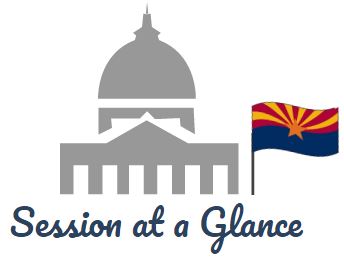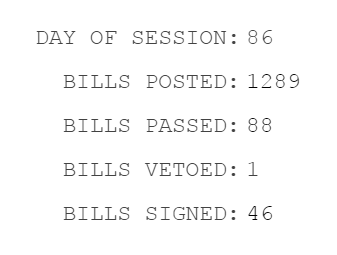April 09,2019 | TRIADVOCATES

1. Today is the 86th day of the 2019 legislative session. In previous years, that would have meant we were heading into the ninth inning. This year, however, it’s highly unlikely that the Legislature will wrap up in 100 days (April 23)—we’re going into extra innings, folks. With the exception of budget bills, there won’t be any more regular committee hearings. As such, members will spend most of their time either in Caucus or on the floor voting on the roughly 450 bills that remain in the system. In the meantime, House and Senate leadership will spend most of their time crafting the FY2019/20 state budget. This is always the most complicated bill to pass and generally involves more than a little horse trading in order to get a vote count of 31—16—1. Among the dozens of small budget requests, there are some big items this year that could impact the fiscal picture. Issues such as federal tax conformity, a possible repeal of the public safety fee passed last year, taxing remote online sellers and the taxation of digital goods all add complexity to an already difficult task. As a result, we expect this session to last for at least another four to five weeks while the Legislature and Governor’s Office attempt to strike a deal. Yay.
2. Speaking of federal tax conformity, there’s only one week left before Arizona taxpayers must file their federal and state taxes. Despite the many attempts to find a solution that both the Legislature and Governor’s Office can live with, we don’t appear to be any closer to a deal than we were in January. All parties agree that we need to conform with the new federal tax code, but the crux of the debate is whether to adjust tax rates to hold taxpayers harmless (as argued by the Legislature) or just conform without lowering the rate and thus collecting extra money to be spent on state programs (as argued by the governor). If you haven’t filed your 2018 returns yet, you might as well just do it. It looks like there won’t be a deal for the 2018 tax year, so elected officials are now focused on finding a long-term solution for 2019 and beyond.
3. Last week, the Yavapai County Board of Supervisors voted 4-1 to appoint former State Senate President Steve Pierce to the state Legislature. He was sworn in to the House of Representatives that afternoon and immediately got to work voting on bills. Pierce, who comes as a breath of fresh air and brings invaluable institutional knowledge, will fill the seat left vacant by David Stringer, who resigned last week amid an ethics investigation. Pierce, is no stranger to the Capitol. He’s a well-respected Arizona rancher and well-known politico who served in the Legislature for eight years and as president of the Senate in 2012. Given his extensive experience and value in the art of compromise, he is expected to be one of the most influential members of the Legislature at a time when both parties are struggling to reach the middle ground on most issues. Further, he’s not planning to run for the seat in 2020, which will give him more freedom to exercise his role as lawmaker, without the political concerns of facing an election. Pierce is known for finding pragmatic solutions and taking strong leadership in key policy issues. In 2011, he was one of six state senators who opposed a handful of controversial anti-immigration bills, and in 2013, he was one of 14 Republican legislators who joined a bipartisan coalition to pass Medicaid expansion, and in 2016, he was instrumental in a bipartisan coalition to restore KidsCare, a federal program to offer low-cost health insurance to thousands of Arizona children.
4. It appears that two of the more controversial bills introduced this session have stalled, with little chance of revival. A bid to allow employers to pay some young workers less than the voter-mandated minimum wage is effectively dead. Yesterday, the Senate Rules Committee decided that the proposal by Republican Rep. Travis Grantham would require a three-fourths vote for approval (the Arizona Constitution spells out that lawmakers can alter or repeal any voter-approved initiative, but only with a three-fourths vote of both the House and Senate). Given that the bill passed the House on a party-line vote (31-29) – far short of the 45 needed – and would now require at least 23 of the 30 senators to vote in favor, it has likely hit the end of the road. Additionally, legislation that would allow DACA recipients to attend Arizona universities for less than the cost of out-of-state tuition hit a major roadblock over Republican objections that the measure “violates the will of the voters.” That’s because Prop. 300 specifically states that the non-residents aren’t eligible to receive a subsidized higher education—a distinction that Senate President Karen Fann supported before voting to hold the bill in the Senate Rules Committee yesterday. The measure, sponsored by Republican Sen. Heather Carter, can still be voted out of the committee at a later date, but would still need the approval of the full Senate, as well as a vote on the House floor. Given that the original version was already blocked by House Speaker Rusty Bowers, it would likely be DOA in the House, even if it passed the Senate again. Close, but no cigar.
5. With the 2020 election in sight, some members of the Legislature have already announced their plans for the next election cycle—many are planning to swap chambers.
- LD 26: Rep. Isela Blanc (D) surprised her Senate seatmate, Sen. Juan Mendez (D), by announcing she plans to challenge him for his seat in the Democratic primary next year.
- LD 2: Sen. Andrea Dalessandro (D) and Rep. Rosanna Gabaldón (D) plan to swap seats.
- LD 8: Rep. TJ Shope (R) and Sen. Frank Pratt (R) will swap as well.
- LD 16: Sen. David Farnsworth (R) announced that he plans to enter the race for the Arizona Corporation Commission; his seatmate, Rep. Kelly Townsend (R) will seek his Senate seat.
- LD 6: Sen. Sylvia Allen will not run for re-election. Her seatmate in the House, Rep. Bob Thorpe (R) has already announced that he plans to run for her seat.
- LD 10: Sen. David Bradley (D) will not run for re-election. His seatmate, Rep. Kirsten Engel (D) plans to run for the Senate spot.





Republican Sen. Heather Carter during a hearing on the striker for a state affordable housing tax credit bill:
“This has been a robust session in terms of our discussions around homelessness and affordable housing… However, this bill is – and maybe I’ll make the quote of the day – a hot mess.”

“Blue Sheet”
If a bill is amended in the opposite house, it must be returned to the chamber of origin, where the amended language is either accepted or rejected. These bills are posted on what is called the “Blue Sheet” for discussion in Caucus. If concurred, the bill will go to the full chamber for a final vote. If rejected, it will be assigned to a conference committee, where leadership from both chambers will assign a small group of members to meet to resolve differences in the legislation. A final vote of the bill that includes the conference committee amendment must then occur in both chambers before sending the bill to the governor.
“The Senate bill sponsor has serious concerns about the amendments adopted in the House. The bill has been posted on tomorrow’s Blue Sheet, where we will see if the sponsor is going to force it to a conference committee before it gets a final vote.”
